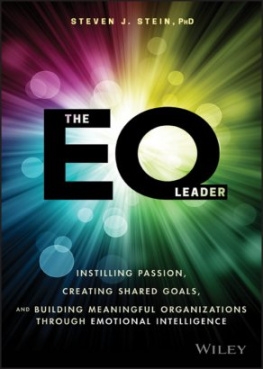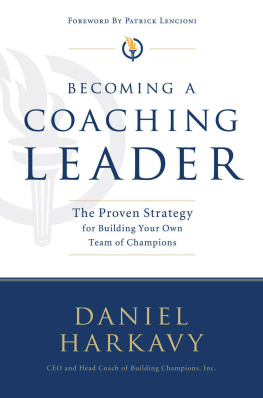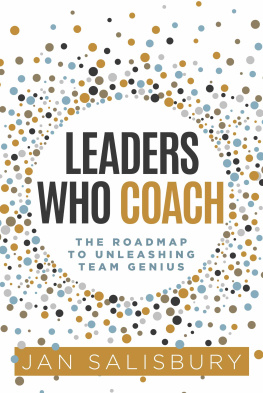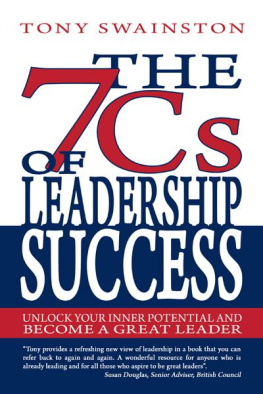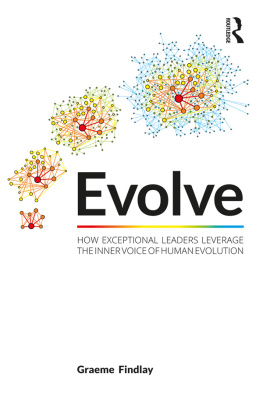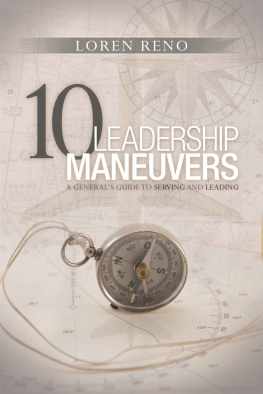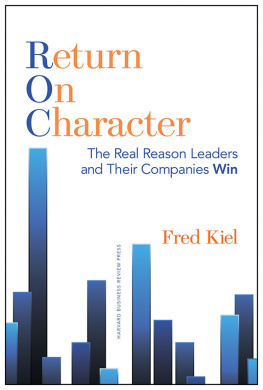Contents
List of Tables
List of Illustrations
The EQ Leader
Instilling Passion, Creating Shared Goals, and Building Meaningful Organizations Through Emotional Intelligence
Steven J. Stein
Cover image: chemc/iStockphoto
Cover design: Wiley
Copyright 2017 by Multi-Health Systems, Inc. All rights reserved.
Published by John Wiley & Sons, Inc., Hoboken, New Jersey.
Published simultaneously in Canada.
No part of this publication may be reproduced, stored in a retrieval system, or transmitted in any form or by any means, electronic, mechanical, photocopying, recording, scanning, or otherwise, except as permitted under Section 107 or 108 of the 1976 United States Copyright Act, without either the prior written permission of the Publisher, or authorization through payment of the appropriate per-copy fee to the Copyright Clearance Center, 222 Rosewood Drive, Danvers, MA 01923, (978) 750-8400, fax (978) 646-8600, or on the web at www.copyright.com . Requests to the Publisher for permission should be addressed to the Permissions Department, John Wiley & Sons, Inc., 111 River Street, Hoboken, NJ 07030, (201) 748-6011, fax (201) 748-6008, or online at www.wiley.com/go/permissions .
Limit of Liability/Disclaimer of Warranty: While the publisher and author have used their best efforts in preparing this book, they make no representations or warranties with the respect to the accuracy or completeness of the contents of this book and specifically disclaim any implied warranties of merchantability or fitness for a particular purpose. No warranty may be created or extended by sales representatives or written sales materials. The advice and strategies contained herein may not be suitable for your situation. You should consult with a professional where appropriate. Neither the publisher nor the author shall be liable for damages arising herefrom.
For general information about our other products and services, please contact our Customer Care Department within the United States at (800) 762-2974, outside the United States at (317) 572-3993 or fax (317) 572-4002.
Wiley publishes in a variety of print and electronic formats and by print-on-demand. Some material included with standard print versions of this book may not be included in e-books or in print-on-demand. If this book refers to media such as a CD or DVD that is not included in the version you purchased, you may download this material at http://booksupport.wiley.com . For more information about Wiley products, visit www.wiley.com .
Library of Congress Cataloging-in-Publication Data:
Names: Stein, Steven (Steven J.), author.
Title: The EQ leader : instilling passion, creating shared goals, and building meaningful organizations through emotional intelligence / Steven J. Stein.
Description: Hoboken, New Jersey : John Wiley & Sons, Inc., [2017] | Includes bibliographical references and index.
Identifiers: LCCN 2017007229 (print) | LCCN 2017016246 (ebook) | ISBN 9781119349006 (cloth) | ISBN 9781119349013 (epdf) | ISBN 9781119349037 (epub)
Subjects: LCSH: Leadership. | Emotional intelligence.
Classification: LCC HD57.7 (ebook) | LCC HD57.7 .S7268 2017 (print) | DDC 658.4/092dc23 LC record available at https://lccn.loc.gov/2017007229
To Micah and Gemma, my grandchildren.
I hope we can advance the state of the art of leadership to the benefit of your world.
CHAPTER 1
LEADERSHIP
WHAT DO WE REALLY KNOW ABOUT LEADERSHIP?
If the highest aim of a captain were to preserve his ship, he would keep it in port forever. THOMAS AQUINAS
What do we really know about leadership? There's been a lot of talk about leadership lately. Judging from the vast number of books, articles, blogs, TED Talks, and more, you would think we have a treasure trove of information about the subject. A quick search on Amazon.com returned 192,136 books dedicated to leadership. In addition, there are hundreds of theses, thousands of articles in journals as well as thousands more research papers on the web. They have been written by a variety of professionals that not only include psychologists but also management theorists, historians, politicians and political scientists, theologians, philosophers, journalists, and other social commentators. Their contributions include scientific analyses, scholarly biographies, and popular accounts of leaders' lives. Knowing how to most effectively lead others can be pretty confusing with that amount of knowledge swirling around. In fact, it's hard to imagine that anyone could think of themselves as an expert in leadership in today's world when there's so much information available.
The Leadership Explosion
How do you deal with so many books on a single subject? Well I have to admit there's no way I was going to go through that many publications. But as I started doing my research, I found that most books fell into one of three categories.
Leader's View
The first group of books are written (or cowritten) by successful leaders. These include biographies of Bill Gates, and many others. These books can be very enlightening and educational, and the insights gained by the experiences of these successful people can guide others along certain pathways.
However, the downside I find is that the views presented tend to be idiosyncratic to those leaders. It's how the individual leader sees the world, which, unfortunately, doesn't always match events as they actually happened.
Having interviewed direct reports of some notable leaders, I can assure you that there are often discrepancies between a leader's reality and that of their direct reports. Anyone who has been involved in 360-degree evaluations of leaders, in which performance reports are taken from subordinates, peers, supervisors, and clients, will also know that the leader can see herself or himself somewhat differently than those around her or him. Therefore, although we can learn from each leader's perspective, these perspectives should not be misinterpreted as universal truths.
Observer's View
The next set of books I would classify as the observer's view . The observer is usually a consultant, a professor, a business writer, a business coach, or some variation of these. These people have had a lot of experience with one or more leaders (although they tend not to be leaders of organizations themselves). They bring a lot of insight out of their experiences working with leaders, theorizing about leaders, or studying leaders. Examples include books by John Maxwell, and others.
The caution with some of these books is that they may come out of preconceived theories with minimal empirical evidence, limited range of leadership settings, use of platitudes, and selective use of examples. There are often useful lessons from these books, but the recommendations are not always practical or easy to apply.
Researcher's View
The third group of books I call the researcher's view . These books tend to come from people with perhaps a few preconceived notions of what makes a good leader, and they approach the subject by evaluating data that encompasses both successful and unsuccessful leadership. Basically, these books use evidence-based procedures in interesting and enlightening ways to evaluate what truly differentiates successful and unsuccessful leaders. Examples include Kouzes and Posner
Jim Collins, for example, in his book Good to Great started his work by practically discounting the importance of leadership and focusing on the structures, rules, and processes of large iconic companies that had been around for many years. By contrasting successful and unsuccessful companies, matched within the same industry, he came to the conclusion, which was contradictory to his expectations, that leadership does make a difference, in fact, a rather large one. He has championed the Level 5 Leadership in which humility and fire in the belly play a dominant role. As he states it:
Next page
